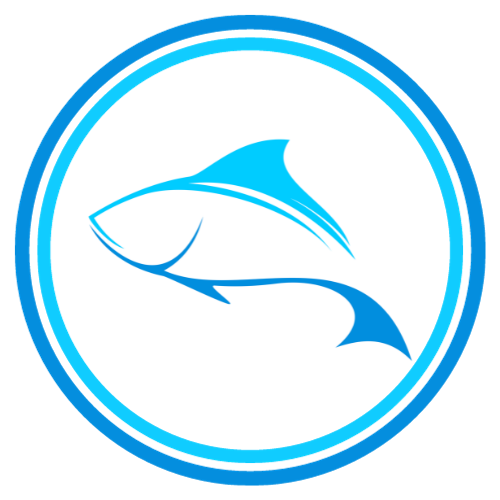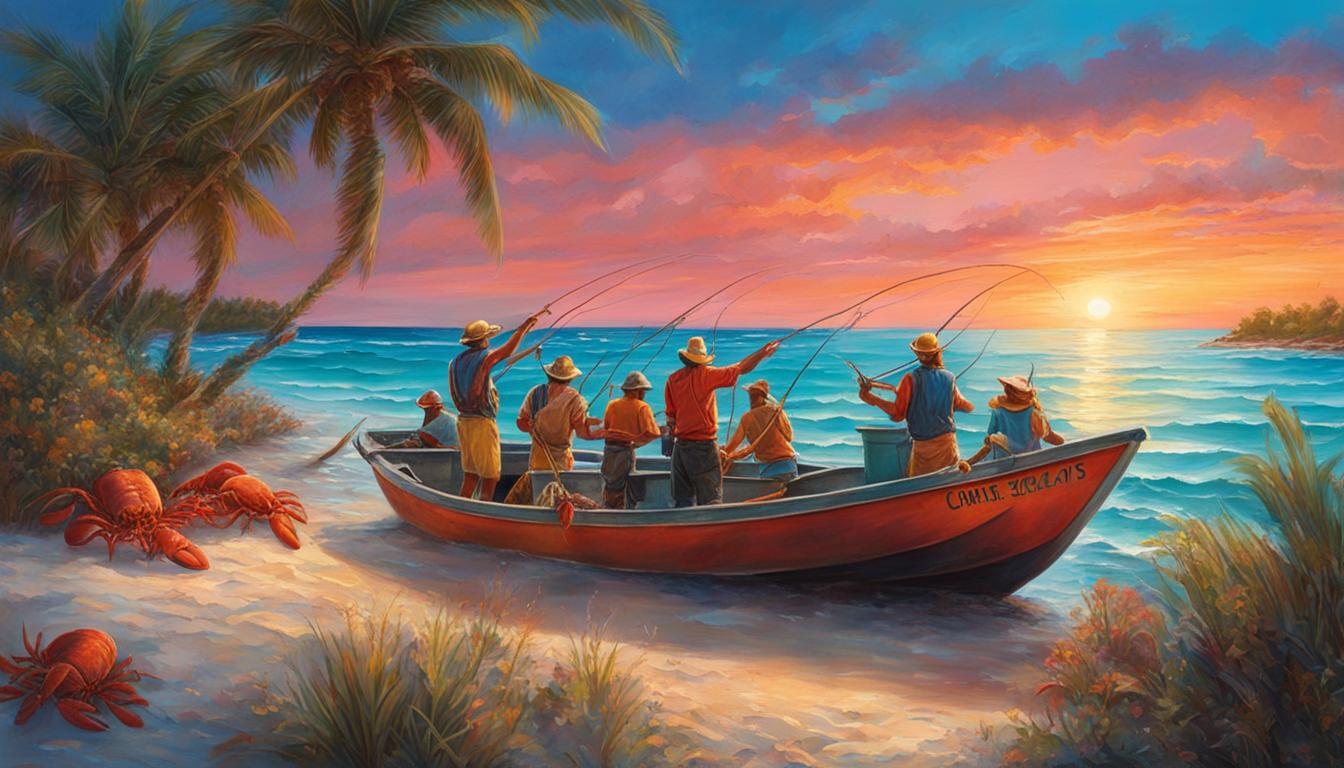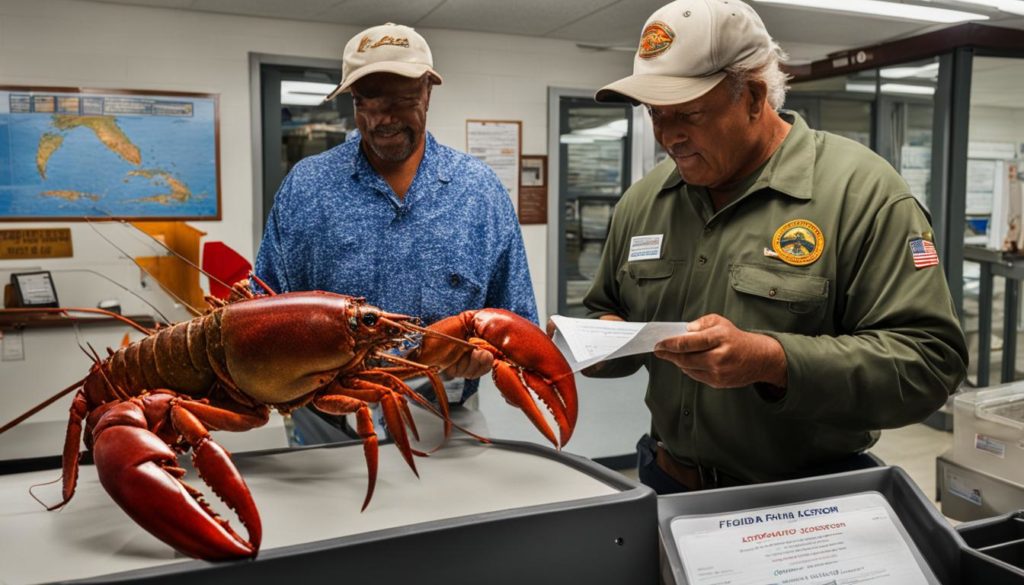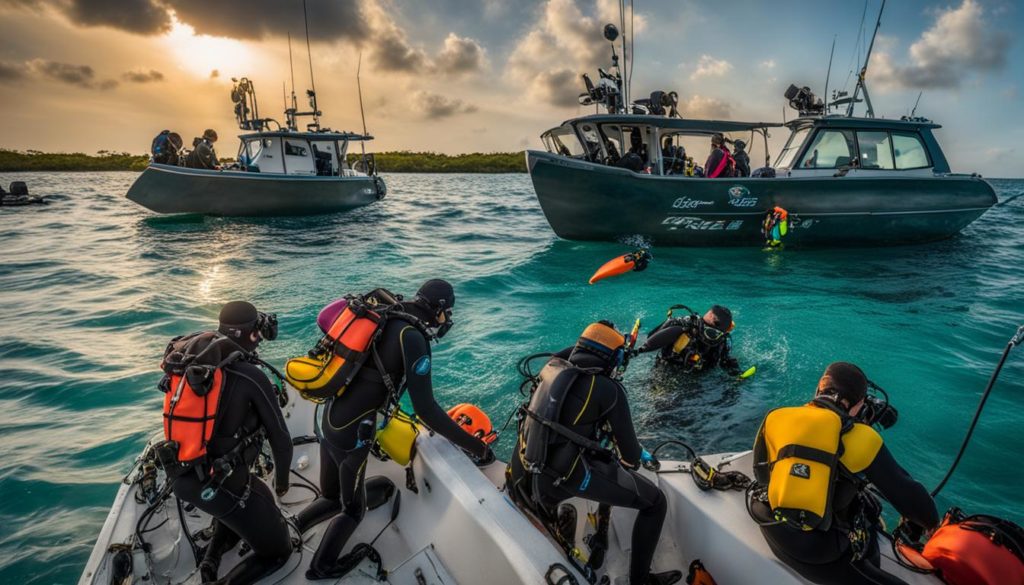If you are interested in lobster fishing in Florida, it’s essential to know the season dates to plan your fishing trips accordingly. Florida is known for its abundant spiny lobster population, making it a popular destination for both recreational and commercial lobster fishing.
The 2023 spiny lobster season opens with the two-day recreational mini-season on July 26 and 27, followed by the regular commercial and recreational lobster season, which starts on August 6 and runs through March 31, 2024. During these seasons, you can venture out and try your luck in capturing these delicious crustaceans.
Florida lobster season dates play a crucial role in determining when it is legal to fish for lobsters. Understanding these dates will ensure that you abide by the rules and regulations set forth by the Florida Fish and Wildlife Conservation Commission (FWC).
Key Takeaways:
- The 2023 spiny lobster season in Florida begins with a two-day recreational mini-season on July 26 and 27.
- The regular commercial and recreational lobster season starts on August 6 and runs through March 31, 2024.
- Knowing the season dates is crucial to ensure compliance with Florida’s fishing regulations.
- Florida is a popular destination for lobster fishing, offering ample opportunities for both recreation and commerce.
- Stay informed about any updates or changes to the lobster season dates by checking the official website of the Florida Fish and Wildlife Conservation Commission.
Florida Lobster Mini-Season
Florida lobster mini-season dates, best time to catch lobsters in Florida
The Florida lobster mini-season, which takes place annually, is a highly anticipated event for lobster enthusiasts and fishing enthusiasts alike. It is considered one of the best times to catch lobsters in Florida, offering a unique opportunity to harvest these delicious crustaceans.
The mini lobster season always occurs on the last consecutive Wednesday and Thursday in July. This year, it falls on July 26th and 27th. Fishermen and divers from all over flock to the waters of Florida during this time, eager to take advantage of the plentiful lobster population.
During the mini-season, recreational fishermen are permitted to harvest lobsters before the regular lobster season begins. This allows them to get an early start and enjoy the thrill of catching these tasty delicacies.
Whether you prefer snorkeling or scuba diving, the Florida lobster mini-season provides an exciting opportunity to explore the underwater world and capture lobsters in their natural habitat. With warm waters and clear visibility, it’s an ideal time to venture into the ocean and search for these delicious creatures.
It’s important to note that during the mini-season, there are specific rules and regulations in place to ensure responsible fishing practices. These regulations include size limits, bag limits, and restrictions on the use of certain fishing equipment. It’s crucial to familiarize yourself with these guidelines before embarking on a lobster fishing adventure.
If you’re planning to participate in the Florida lobster mini-season, be sure to equip yourself with the necessary gear, including a sturdy net or lobster tickle stick, a measuring device, and a dive flag for safety. Remember to always follow the rules, respect the environment, and practice responsible fishing.
Now that you know when the Florida lobster mini-season occurs, it’s time to start planning your lobster fishing excursion and make the most of this exciting event.
Florida Lobster Season Regulations
To ensure responsible fishing and protect Florida’s lobster population, there are specific regulations in place for lobster fishing in the state. These regulations cover bag limits, size limits, and designated areas for harvest. It is important for anglers to familiarize themselves with these regulations to ensure compliance and contribute to the sustainability of the fishery.
Florida Fish and Wildlife Conservation Commission (FWC) and the Monroe County Tourist Development Council provide detailed information on Florida lobster fishing regulations. By visiting their official websites, you can access the most up-to-date information regarding catch limits for lobsters in Florida.
Understanding the regulations is crucial as it helps preserve the lobster population and ensures that there are enough lobsters for future generations of fishermen. Adhering to the catch limits and size limits allows for the growth and reproduction of lobsters, maintaining a healthy ecosystem.
Image: A Florida lobster being measured to comply with size regulations.
Safe Boating and Conservation
During lobster season in Florida, it is crucial to prioritize safe boating and protect the state’s beautiful coral reefs. The Florida Fish and Wildlife Conservation Commission (FWC) emphasizes the importance of responsible boating practices to ensure a safe and enjoyable experience for everyone.
To protect Florida’s coral reefs, boaters should refrain from shining lights at houses or people along the shoreline while engaging in activities like bully netting. This helps minimize disturbances to marine life and ensures the preservation of these delicate ecosystems.
Additionally, boaters must take care to avoid damaging corals and other marine organisms. The FWC has implemented initiatives such as the Florida Coral Crew, which engages sportsmen and women in efforts to combat Stony Coral Tissue Loss Disease. By participating in these initiatives and following responsible boating practices, boaters can contribute to the preservation of Florida’s coral reefs.
| Safe Boating Tips during Lobster Season | Conservation Guidelines |
|---|---|
|
|
Licensing and Permits
Before participating in lobster fishing in Florida, it is important to obtain the necessary licenses and permits. This includes a recreational saltwater fishing license and a spiny lobster permit. These can be obtained through the official website of the Florida Fish and Wildlife Conservation Commission.
Having the required licenses and permits ensures that you are acting within the legal boundaries and regulations set by the state. It also helps in maintaining the sustainability of the lobster fishery in Florida.
| Licenses and Permits | Description |
|---|---|
| Recreational Saltwater Fishing License | A license that allows individuals to engage in recreational saltwater fishing activities in Florida. |
| Spiny Lobster Permit | A permit specifically required for catching spiny lobsters in Florida. |
Obtaining these licenses and permits is a straightforward process through the Florida Fish and Wildlife Conservation Commission’s official website. Make sure to complete the necessary applications and pay the required fees to secure your licenses and permits.
Once you have obtained the licenses and permits, you can enjoy the thrill of lobster fishing in Florida while ensuring that you are following the rules and regulations set to protect the lobster population and the marine ecosystem.
Safety Tips for Diving
When diving for lobsters during the lobster season, it’s crucial to prioritize safety. Taking precautionary measures can help ensure a safe and enjoyable diving experience. Here are some important safety tips to consider:
- Wear a Life Jacket: While underway, it is recommended to wear a life jacket to ensure buoyancy and safety during your dive. A life jacket can provide added security, especially in open water.
- Abstain from Alcohol: Diving under the influence of alcohol is extremely dangerous and can impair judgment and coordination. It is imperative to avoid consuming alcohol before and during your dive to maintain optimal safety.
- Stay within Required Distance: When diving in open water, it’s important to stay within the required distance of a properly displayed divers-down flag or device. This helps in alerting boat operators of the presence of divers and ensures their safety.
Following these safety guidelines will not only help protect yourself but also contribute to the overall safety of all divers in the water. It’s essential to prioritize safety during lobster season to have a memorable and incident-free diving experience.
Measuring and Harvesting Lobsters
When it comes to lobster fishing in Florida, knowing how to measure lobsters accurately is crucial to ensure compliance with legal requirements. The carapace, which is the hard part of the shell, must measure greater than three inches for a lobster to be legally harvested.
To measure a Florida lobster properly, locate the groove at the base of its antennae, known as the “eye socket.” Align a measuring device, such as a lobster gauge or ruler, with the groove and extend it along the carapace to the rear edge. The carapace length should exceed the three-inch threshold.
It is essential to take responsible harvesting practices into account while measuring lobsters. Avoid unnecessary harm to undersized lobsters or those carrying eggs by handling them with care and releasing them safely back into the water. This practice contributes to the sustainability of the lobster population and helps maintain a thriving ecosystem.
Local Regulations in the Florida Keys
When it comes to lobster fishing in the Florida Keys, it’s important to be aware of the unique regulations that apply to this area. While Florida as a whole has specific lobster fishing regulations, the Florida Keys may have additional rules and restrictions that differ from other parts of the state.
One important regulation to note is that snorkeling or diving is not allowed within 300 feet of residential or commercial shorelines in the Florida Keys. This is to ensure the safety and privacy of residents and visitors in these areas.
Furthermore, there are specific rules for the sport season and regular season in the Florida Keys. It is crucial to familiarize yourself with these local ordinances to ensure compliance with the regulations. This will help you have a smooth and enjoyable lobster fishing experience while protecting the natural resources of the Florida Keys.
For detailed information on the lobster fishing regulations in the Florida Keys, it is recommended to consult the official sources such as the Florida Fish and Wildlife Conservation Commission (FWC) or local fishing authorities. They will provide you with specific guidelines on daily limits, size restrictions, and other important regulations that must be followed.
Conservation Areas and No-Take Zones
In order to protect the lobster population and preserve marine ecosystems, specific areas within the Florida Keys National Marine Sanctuary have been designated as no-take zones. These areas are closed year-round for lobster harvesting and are marked by distinctive yellow boundary buoys. It is vital to respect these conservation areas and refrain from harvesting lobsters within their boundaries.
Aside from the no-take zones in the Florida Keys National Marine Sanctuary, there are other closed areas where lobster harvesting is strictly prohibited. These areas include national parks and specific state parks, which have implemented measures to conserve the marine environment and promote sustainable lobster populations.
By honoring these closed areas and no-take zones, you contribute to the overall preservation of lobster populations and the preservation of vital marine ecosystems. Respect for these regulations enhances the long-term sustainability of the fishery and ensures future generations can enjoy the thrill of lobster fishing in Florida.
Safe Diving Practices
Safety is paramount when diving for lobsters. To ensure a safe and enjoyable diving experience during lobster season, it is essential to follow proper diving practices and precautions. Here are some important tips:
1. Check Your Gear
Before diving, always ensure that your diving gear is in good working order. Check your mask, snorkel, fins, BCD (buoyancy control device), regulator, and dive computer for any signs of damage or malfunction. It is crucial to have reliable and properly maintained equipment to dive safely.
2. Review Your Diving Skills
Whether you are an experienced diver or new to the sport, it is recommended to review or refresh your diving skills before lobster season. Familiarize yourself with proper buoyancy control, equalization techniques, and underwater navigation. Additionally, practice emergency procedures and ensure you are comfortable in different diving environments.
3. Avoid Decompression Sickness
One of the most significant risks in diving is decompression sickness, also known as “the bends.” To prevent this condition, always follow the “no-decompression” guidelines according to your dive tables or dive computer. Ascend slowly and make safety stops as recommended by diving standards. If you are unsure about decompression limits, consider taking a refresher course or consulting with a dive professional.
4. Beware of Shallow Water Blackout
Shallow water blackout is a dangerous condition that can occur when a diver holds their breath, ascends quickly, or hyperventilates before diving. It can lead to loss of consciousness underwater and, in severe cases, be fatal. To prevent shallow water blackout, always practice proper breathing techniques and never push your breath-holding limits. Remember to breathe continuously and never skip the exhale phase.
5. Familiarize Yourself with Boating Safety
Diving for lobsters often involves boat-based excursions. Ensure you are familiar with boating safety practices, such as using appropriate signals, maintaining a safe distance from other vessels, and understanding navigation rules. If you are new to boating, consider taking a boating safety course to enhance your knowledge and confidence.
6. Navigate Shallow Island Waters
In the Florida Keys, diving for lobsters often takes place in shallow island waters. Familiarize yourself with the area’s unique underwater topography, including potential hazards such as coral reefs, seagrass beds, and shallow sandbars. It is essential to navigate cautiously, paying close attention to depth and avoiding any contact that could damage the delicate ecosystems.
By following these essential safety tips, you can minimize the risks and maximize the enjoyment of your lobster diving adventures. Remember, your safety and the preservation of marine life are of utmost importance.
Boating Safety Tips
When boating in the Florida Keys, it is vital to prioritize safety and protect the delicate coral reef ecosystem. By following these boating safety tips, you can ensure an enjoyable and responsible boating experience.
Navigation and Anchoring
Proper navigation is crucial to avoid damaging coral reefs. Remember:
- Do not anchor on coral reefs, as it causes irreparable harm. Instead, use mooring buoys or locate sandy bottoms for anchoring.
- Be aware of protected areas and stay clear of restricted zones. Consult the Marine Sanctuary Explorer app for information on protected waters and regulations.
Education and Regulations
Stay informed about boating regulations and take a boating course to acquire the knowledge and skills necessary for responsible boating:
- Educate yourself on local rules and regulations enforced in the Florida Keys. Stay aware of specific boating safety laws and guidelines.
- Consider completing a boating safety course to enhance your boating skills and understanding of safe practices.
Protecting the Coral Reef Ecosystem
The Florida Keys’ coral reef ecosystem is fragile and highly valuable. Help protect it by taking the following measures:
- Avoid touching or standing on coral reefs while snorkeling or diving. Maintain a respectful distance to prevent accidental damage.
- Pack any trash or debris and dispose of it properly to prevent pollution of the marine environment.
By adhering to these boating safety tips and practicing coral reef protection, you can contribute to the preservation of Florida’s stunning underwater habitats.
Conclusion
Lobster fishing in Florida provides a unique and exciting experience for both recreational and commercial anglers. Understanding the season dates, regulations, and conservation efforts is crucial for the success and sustainability of this fishery. By adhering to the guidelines and practicing responsible fishing and boating, you can ensure a safe and enjoyable lobster fishing adventure.
Florida’s lobster season begins with the highly anticipated two-day mini-season in late July, followed by the regular season running from August to March the following year. It is important to stay updated on the latest season dates to plan your lobster fishing trips accordingly.
Compliance with the fishing regulations plays a vital role in protecting the lobster population and maintaining a healthy ecosystem. Be familiar with the bag limits, size limits, and harvesting locations specified by the Florida Fish and Wildlife Conservation Commission. Ensure you have the necessary licenses and permits, such as the recreational saltwater fishing license and the spiny lobster permit, to avoid any legal complications.
Conservation efforts are vital for the long-term sustainability of lobster fishing in Florida. By respecting no-take zones, avoiding damaging corals and marine life, and participating in initiatives like the Florida Coral Crew, you can contribute to the preservation of the delicate marine ecosystem.
FAQ
When does the Florida lobster season start?
The 2023 spiny lobster season opens with the two-day recreational mini-season on July 26 and 27, followed by the regular commercial and recreational lobster season, which starts Aug. 6 and runs through March 31, 2024.
When is the mini lobster season in Florida?
The mini lobster season in Florida is always the last consecutive Wednesday and Thursday in July. This year, it falls on July 26th and 27th. It is considered one of the best times to catch lobsters in Florida.
Are there regulations for lobster fishing in Florida?
Yes, there are regulations in place for lobster fishing in Florida. Bag limits, size limits, and where to harvest are important factors to consider. It is advised to visit the official website of the Florida Fish and Wildlife Conservation Commission (FWC) or the Monroe County Tourist Development Council for detailed information on these regulations.
How can I ensure safe boating and protect Florida’s coral reefs during lobster season?
To ensure safe boating and protect Florida’s coral reefs during lobster season, boaters are reminded to practice safe boating practices, avoid shining lights at houses or people along the shoreline while bully netting, and take care to avoid damaging corals and marine life. The FWC has initiatives in place, such as the Florida Coral Crew, to engage sportsmen and women in the effort to combat Stony Coral Tissue Loss Disease.
What licenses and permits do I need for lobster fishing in Florida?
Before participating in lobster fishing in Florida, it is important to obtain the necessary licenses and permits. This includes a recreational saltwater fishing license and a spiny lobster permit. These can be obtained through the official website of the Florida Fish and Wildlife Conservation Commission.
What safety precautions should I take while diving for lobsters in Florida?
Diving for lobsters requires safety precautions. Divers are advised to wear a life jacket while underway and to refrain from consuming alcohol. When diving in open water, divers should stay within the required distance of a properly displayed divers-down flag or device. Boat operators must also observe these rules to ensure the safety of divers in the water.
How do I measure lobsters correctly for harvesting in Florida?
It is important to measure lobsters correctly to ensure they are of legal size. The carapace, the hard part of the shell, must measure greater than three inches for a lobster to be legally harvested. Proper gauging techniques and responsible harvesting practices should be followed.
Are there specific regulations for lobster fishing in the Florida Keys?
Yes, the regulations for lobster fishing in the Florida Keys may differ from other parts of Florida. Snorkeling or diving is not allowed within 300 feet of residential or commercial shoreline, and there are specific rules for sport season and regular season. It is important to familiarize yourself with the local ordinances in the Florida Keys to ensure compliance with the regulations.
Are there any areas in Florida where lobster harvesting is prohibited?
Yes, there are certain areas within the Florida Keys National Marine Sanctuary that are designated as no-take zones and are closed year-round for lobster harvesting. These areas are marked by yellow boundary buoys. Additionally, there are other closed areas, such as national parks and specific state parks, where lobster harvesting is prohibited. It is important to respect these conservation areas and avoid harvesting in these zones.
What are some safety tips for diving during lobster season?
Safety is paramount when diving for lobsters. Divers are advised to ensure their gear is in good working order and to review or refresh their diving skills. Basic skills, including avoiding the bends and shallow water blackout, should be practiced. It is also important to familiarize yourself with boating safety and navigation in the Florida Keys’ shallow island waters.
What are some boating safety tips for lobster fishing in Florida?
Boating in the Florida Keys requires careful navigation and respect for the coral reef ecosystem. Anchoring on coral is prohibited, and boaters are encouraged to use mooring buoys or find sandy bottoms for anchoring. It is important to educate yourself on boating regulations and take a boating course for responsible boating practices. The Marine Sanctuary Explorer app can provide information on protected waters and regulations.
How can I enjoy a successful and sustainable lobster fishing experience in Florida?
Lobster fishing in Florida offers opportunities for both recreation and commercial purposes. It is important to be aware of the season dates, regulations, and conservation efforts to ensure a successful and sustainable fishery. By following the guidelines and practicing responsible fishing and boating, anglers can enjoy a safe and enjoyable lobster fishing experience.




